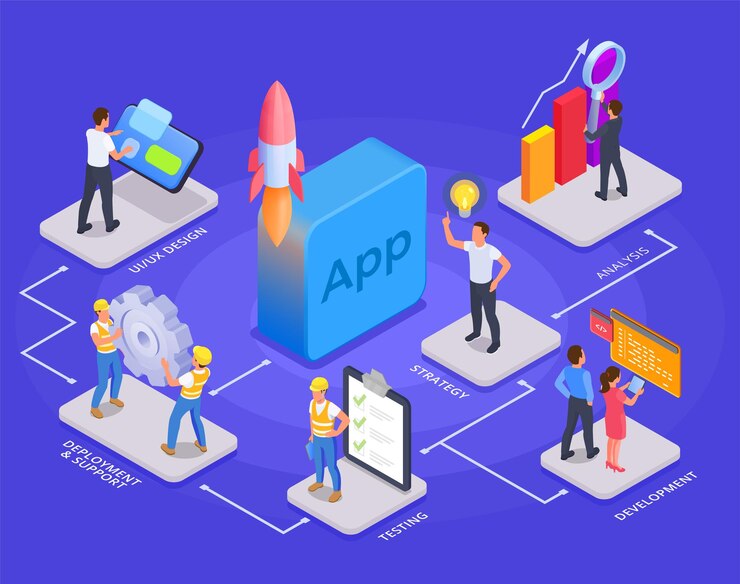Introduction to Mobile App Development
Mobile app development involves creating software applications specifically designed to run on mobile devices. These applications can be developed for various platforms, including iOS and Android, catering to different user preferences and requirements.
Importance of Staying Updated with Tools and Technologies
In the dynamic world of technology, staying updated with the latest tools and technologies is crucial for mobile app developers. New advancements offer improved efficiency, enhanced features, and better user experiences, giving developers a competitive edge in the market.
Native App Development Tools
Native app development involves creating applications for a specific platform using platform-specific programming languages and tools. Some popular tools for native app development include:
IDEs (Integrated Development Environments)
IDEs such as Xcode for iOS and Android Studio for Android provide developers with comprehensive environments for building, testing, and debugging native apps.
Frameworks
Frameworks like Swift for iOS and Kotlin for Android streamline the development process by offering pre-built components and libraries, reducing development time and effort.
Cross-Platform Development Tools
Cross-platform development allows developers to write code once and deploy it across multiple platforms, saving time and resources. Some prominent cross-platform development tools include:
React Native
Developed by Facebook, React Native enables developers to build native-like mobile applications using JavaScript and React, offering a balance between performance and efficiency.
Flutter
Google’s Flutter framework allows developers to create high-quality native interfaces for iOS and Android using a single codebase, enhancing productivity and consistency across platforms.
Backend Development Tools and Technologies
Backend development involves building server-side components and APIs to support mobile applications. Some essential tools and technologies for backend development include:
Node.js
Node.js provides a runtime environment for building scalable and efficient server-side applications using JavaScript, making it ideal for real-time and data-intensive mobile apps.
Django
Django is a high-level Python web framework that simplifies backend development with its built-in features, including authentication, routing, and database management.
Cloud Services for Mobile Apps
Cloud services offer scalable infrastructure and storage solutions for mobile applications, enabling seamless deployment and management. Leading cloud service providers include:
AWS (Amazon Web Services)
AWS offers a wide range of services, including compute, storage, databases, and machine learning, empowering developers to build and scale mobile apps with ease.
Google Cloud Platform
Google Cloud Platform provides a robust infrastructure for mobile app development, with services like Firebase offering authentication, analytics, and cloud messaging.
AI and Machine Learning in Mobile App Development
AI and machine learning technologies are revolutionizing mobile app development, enabling personalized experiences and predictive analytics. Integrating AI capabilities into mobile apps requires tools such as TensorFlow and Core ML.
Augmented Reality (AR) and Virtual Reality (VR) Tools
AR and VR technologies are reshaping the way users interact with mobile applications. Tools like ARKit (iOS) and ARCore (Android) enable developers to create immersive AR experiences, while platforms like Unity3D and Unreal Engine support VR development.
IoT (Internet of Things) Integration Tools
The Internet of Things (IoT) enables connectivity between mobile devices and smart objects, opening up new possibilities for mobile app developers. Tools such as Arduino and Raspberry Pi facilitate IoT integration, allowing for the development of innovative IoT-enabled applications.
Security Tools and Practices
Ensuring the security of mobile applications is paramount to protecting user data and maintaining trust. Security tools like Appknox and practices such as encryption and secure authentication help mitigate security risks and vulnerabilities.
Testing and Debugging Tools
Thorough testing and debugging are essential stages in the mobile app development lifecycle. Tools like Appium and XCTest enable automated testing across multiple devices and platforms, ensuring the reliability and performance of mobile applications.
Continuous Integration and Deployment (CI/CD) Tools
CI/CD tools automate the process of building, testing, and deploying mobile apps, facilitating rapid development cycles and seamless updates. Popular CI/CD platforms include Jenkins, CircleCI, and Travis CI.
Trends in Mobile App Development
Mobile app development is constantly evolving, with emerging trends shaping the future of the industry. Some current trends include progressive web apps, instant apps, and low-code/no-code development platforms, offering new opportunities for innovation and growth.
Conclusion
Staying updated with the latest tools and technologies is essential for Mobile App Developers to meet the evolving demands of the industry. By embracing innovation and leveraging cutting-edge solutions, developers can create powerful and engaging mobile applications that delight users and drive business success.
FAQs
- What are the benefits of cross-platform development?
- Cross-platform development reduces development time and costs by allowing developers to write code once and deploy it across multiple platforms.
- How can AI and machine learning enhance mobile app development?
- AI and machine learning technologies enable personalized experiences, predictive analytics, and automation, enhancing the functionality and intelligence of mobile applications.
- What security measures should developers implement in mobile app development?
- Developers should implement encryption, secure authentication, and regular security audits to protect user data and mitigate security risks.
- Why is continuous integration and deployment important in mobile app development?
- Continuous integration and deployment streamline the development process, ensuring rapid iterations, seamless updates, and high-quality releases.
- What are some emerging trends in mobile app development?
- Emerging trends include progressive web apps, instant apps, and low-code/no-code development platforms, offering new opportunities for innovation and growth.



